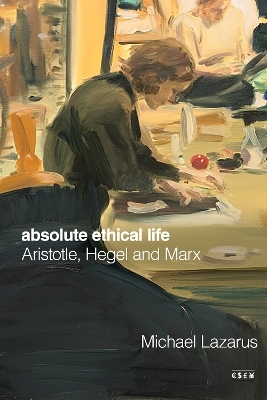
Absolute Ethical Life
Aristotle, Hegel and Marx
Seiten
2025
Stanford University Press (Verlag)
978-1-5036-4170-9 (ISBN)
Stanford University Press (Verlag)
978-1-5036-4170-9 (ISBN)
- Noch nicht erschienen (ca. Juni 2025)
- Versandkostenfrei innerhalb Deutschlands
- Auch auf Rechnung
- Verfügbarkeit in der Filiale vor Ort prüfen
- Artikel merken
Karl Marx gave us not just a critique of the political economy of capital, but a way of confronting the impoverished ethical quality of life we face under capitalism. Interpreting Marx anew as an ethical thinker, Absolute Ethical Life provides crucial resources for understanding how freedom and rational agency are impacted by a social world formed by value under capitalism, with consequences for philosophy today.
Michael Lazarus situates Marx within a shared tradition of ethical inquiry, placing him in close dialogue with Aristotle and Hegel. Lazarus traces the ethical and political dimensions of Marx's work missed by Hannah Arendt and Alasdair MacIntyre, two of the most profound critics of modern politics and ethics. Ultimately, the book claims that Marx's value-form theory is both a continuation of Aristotelian and Hegelian themes and at the same time his most distinctive theoretical achievement.
In this normative interpretation of Marx, Lazarus integrates recent moral philosophy with a historically specific analysis of capitalism as a social form of life. He challenges contemporary political and economic theory to insist that any conception of modern life needs to account for capitalism. With a robust critique of capitalism derived from the determinations of what Marx calls the "form of value," Lazarus argues for an ethical life beyond capital.
Michael Lazarus situates Marx within a shared tradition of ethical inquiry, placing him in close dialogue with Aristotle and Hegel. Lazarus traces the ethical and political dimensions of Marx's work missed by Hannah Arendt and Alasdair MacIntyre, two of the most profound critics of modern politics and ethics. Ultimately, the book claims that Marx's value-form theory is both a continuation of Aristotelian and Hegelian themes and at the same time his most distinctive theoretical achievement.
In this normative interpretation of Marx, Lazarus integrates recent moral philosophy with a historically specific analysis of capitalism as a social form of life. He challenges contemporary political and economic theory to insist that any conception of modern life needs to account for capitalism. With a robust critique of capitalism derived from the determinations of what Marx calls the "form of value," Lazarus argues for an ethical life beyond capital.
Michael Lazarus is a postdoctoral research fellow at Deakin University.
| Erscheint lt. Verlag | 3.6.2025 |
|---|---|
| Reihe/Serie | Currencies: New Thinking for Financial Times |
| Verlagsort | Palo Alto |
| Sprache | englisch |
| Maße | 152 x 229 mm |
| Themenwelt | Geisteswissenschaften ► Philosophie ► Ethik |
| Wirtschaft ► Volkswirtschaftslehre ► Wirtschaftspolitik | |
| ISBN-10 | 1-5036-4170-8 / 1503641708 |
| ISBN-13 | 978-1-5036-4170-9 / 9781503641709 |
| Zustand | Neuware |
| Haben Sie eine Frage zum Produkt? |
Mehr entdecken
aus dem Bereich
aus dem Bereich
unsere kollektive Verantwortung
Buch | Hardcover (2023)
wbg Theiss in Wissenschaftliche Buchgesellschaft (WBG) (Verlag)
35,00 €


